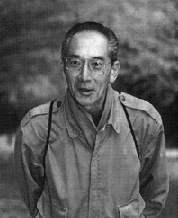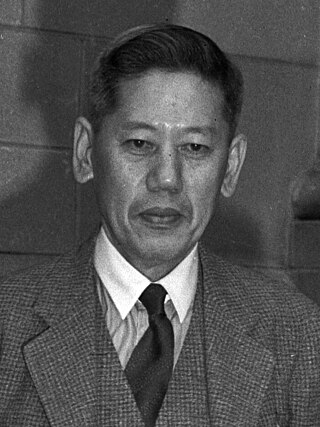Emma Gee | |
|---|---|
 Gee in 1980 | |
| Alma mater | University of California, Berkeley |
| Occupation | writer |
| Known for | Co-originator of the term Asian American |
Emma Gee was an American activist and writer, who coined the term "Asian American" with Yuji Ichioka.
Emma Gee | |
|---|---|
 Gee in 1980 | |
| Alma mater | University of California, Berkeley |
| Occupation | writer |
| Known for | Co-originator of the term Asian American |
Emma Gee was an American activist and writer, who coined the term "Asian American" with Yuji Ichioka.
In 1968, Chinese American Gee and her Japanese American partner and future husband Yuji Ichioka, both graduate students at University of California, Berkeley, founded the Asian American Political Alliance and coined the term "Asian American." [1] [2] [3] [4] [5] She was instrumental in bringing together writings from Asians in America, most notably in the work Counterpoint (1978). [6] Gee taught some of the earliest classes in Asian American studies at Berkeley and University of California, Los Angeles. [7]
Gee is also an advocate of Asian American women and urged them to write and share prose and poetry. This included editing the book Asian Women (1971), developed from the first class ever taught on Asian Women in Berkeley. [7] [8] [9] She was later also involved in the Pacific Asian American Women Writers West, established in 1978. [10]
In 2004, UCLA's Asian American Studies Center created the "Yuji Ichioka and Emma Gee Endowment for Social Justice and Immigration Studies" in honor of Ichioka and Gee's work. [4]
Emma Gee passed away on April 15, 2023. [11]

Issei are Japanese immigrants to countries in North America and South America. The term is used mostly by ethnic Japanese. Issei are born in Japan; their children born in the new country are nisei ; and their grandchildren are sansei.

Asian Americans are Americans of Asian ancestry. Although this term had historically been used for all the indigenous peoples of the continent of Asia, the usage of the term "Asian" by the United States Census Bureau only includes people with origins or ancestry from East Asia, Southeast Asia, and the Indian subcontinent and excludes people with ethnic origins in certain parts of Asia, including West Asia who are now categorized as Middle Eastern Americans. Furthermore, Central Asians are not mentioned in any census racial category. The "Asian" census category includes people who indicate their race(s) on the census as "Asian" or reported entries such as "Chinese, Indian, Bangladeshi, Filipino, Vietnamese, Indonesian, Korean, Japanese, Pakistani, Malaysian, and Other Asian". In 2020, Americans who identified as Asian alone (19,886,049) or in combination with other races (4,114,949) made up 7.2% of the U.S. population.

Yuji Ichioka was an American historian and civil rights activist best known for his work in ethnic studies, particularly Asian American Studies and for being a leader in the Asian American movement. An adjunct professor at UCLA, he and Emma Gee coined the term "Asian American" in 1968 during the founding of the Asian American Political Alliance, to help unify different Asian ethnic groups, and was considered the preeminent scholar of Japanese American history.

Robert Baker Dairyu Chotan Aitken Rōshi was a Zen teacher in the Harada-Yasutani lineage. He co-founded the Honolulu Diamond Sangha in 1959 together with his wife, Anne Hopkins Aitken. Aitken received Dharma transmission from Koun Yamada in 1985 but decided to live as a layperson. He was a socialist and anarchist who advocated social justice for homosexuals, women and Native Hawaiians throughout his life, and was one of the original founders of the Buddhist Peace Fellowship.

Yuri Kochiyama was an American civil rights activist. Influenced by her Japanese-American family's experience in an American internment camp, her association with Malcolm X, and her Maoist and Islamic beliefs, she advocated for many causes, including black separatism, the anti-war movement, reparations for Japanese-American internees, and the rights of political prisoners.
Asian American Studies is an academic field originating in the 1960s, which critically examines the history, issues, sociology, religion, experiences, culture, and policies relevant to Asian Americans. It is closely related to other Ethnic Studies fields, such as African American Studies, Latino Studies, and Native American Studies.

Yamato Ichihashi was one of the first academics from East Asia in the United States. Ichihashi wrote a comprehensive account of his experiences as an internee at the Tule Lake War Relocation Center, where he was detained during World War II along with other relocated Japanese Americans.
Judy Yung was a historian and professor emerita in American Studies at the University of California, Santa Cruz. She specialized in oral history, women's history, and Asian American history. She died on December 14, 2020, in San Francisco, where she had returned in retirement.
Nellie Wong is an American poet and activist for feminist and socialist causes. Wong is also an active member of the Freedom Socialist Party and Radical Women.
Michael Omi is an American sociologist, writer, scholar, and educator. Omi has served on the faculty at the University of California, Berkeley. He is the Associate Director of the Haas Institute for a Fair and Inclusive Society. Omi is best known for developing the theory of racial formation along with Howard Winant. Omi's work includes race theory, Asian American studies, and antiracist scholarship. Omi sits on the faculty advisory board of the Berkeley Center for Right-Wing Studies.
Panethnicity is a political neologism used to group various ethnic groups together based on their related cultural origins; geographic, linguistic, religious, or 'racial' similarities are often used alone or in combination to draw panethnic boundaries. The term panethnic was used extensively during mid-twentieth century anti-colonial/national liberation movements. In the United States, Yen Le Espiritu popularized the term and coined the nominal term panethnicity in reference to Asian Americans, a racial category composed of disparate peoples having in common only their origin in the continent of Asia.
Eiichiro Azuma is a Japanese-born American historian, writer, and professor. He has served as a Professor of History and Asian American Studies at the University of Pennsylvania. The focus of his work is Japanese Americans in relationship to migration, Japanese colonialism, and U.S. and Japan relations.
Gosei is a Japanese diasporic term used in countries, particularly in North America and in South America, to specify the great-great-grandchildren of Japanese immigrants (Issei). The children of Issei are Nisei. Sansei are the third generation, and their offspring are Yonsei. The children of at least one Yonsei parent are called Gosei.

Asian/Pacific American (APA) or Asian/Pacific Islander (API) or Asian American and Pacific Islanders (AAPI) or Asian American and Native Hawaiians/Pacific Islander (AANHPI) is a term sometimes used in the United States when including both Asian and Pacific Islander Americans.
Nayan Shah is Professor of American Studies and Ethnicity and History at University of Southern California. He received his doctoral degree in history at the University of Chicago and previously worked as a professor of history at University of California, San Diego and Binghamton University.
There is a Japanese American and a Japanese national population in San Francisco and the San Francisco Bay Area. The center of the Japanese and Japanese American community is in San Francisco's Japantown.
Robert Evans Buswell Jr. is an American academic, author and scholar of Korean Buddhism and Chinese Buddhism as well as Korean religions in general. He is Distinguished Professor of Buddhist Studies at the University of California, Los Angeles and founding director of the Academy of Buddhist Studies at Dongguk University, Korea's main Buddhist university.
The Asian American Movement was a sociopolitical movement in which the widespread grassroots effort of Asian Americans affected racial, social and political change in the U.S., reaching its peak in the late 1960s to mid-1970s. During this period Asian Americans promoted anti-war and anti-imperialist activism, directly opposing what was viewed as an unjust Vietnam war. The American Asian Movement (AAM) differs from previous Asian American activism due to its emphasis on Pan-Asianism and its solidarity with U.S. and international Third World movements such as the Third World Liberation Front.
The Asian American Political Alliance (AAPA) was a political organization started at University of California, Berkeley in 1968 that aimed to unite all Asian Americans under one identity to push for political and social action. The two main chapters were at UC Berkeley, and San Francisco State College, both of which became heavily involved in the larger Asian American movement throughout the 1960s, including at the Third World Liberation Front strikes at SF State and at UC Berkeley. The AAPA identified as an anti-imperialistic, Third World political organization that fought for self-determination and liberation for Asian Americans. They expressed solidarity and support for other people of color throughout the US and throughout the world, particularly in colonized or recently decolonized countries. The AAPA's participation in the Third World Liberation Front strikes at SF State and UC Berkeley resulted in the creation of a School of Ethnic Studies at SF State and an Ethnic Studies department at UC Berkeley. The AAPA was also involved in movements such as the Black Power Movement and the anti-Vietnam War movement. Although both main chapters were short-lived and disbanded in 1969, the AAPA played a large role in the Asian American movement and was influential in encouraging other Asian Americans to get involved in political action.